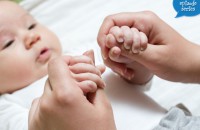The Boob Group
Breastfeeding and Medication
[00:00:00]
Please be advised, this transcription was performed from a company independent of New Mommy Media, LLC. As such, translation was required which may alter the accuracy of the transcription.
[Theme Music]
Robin Kaplan: Prescription medications, over- the-counter medications and herbs can be a complicated topic for breastfeeding mothers. Which ones are compatible with breastfeeding and which one should you stay away with, with a 10 foot pole? Where can a breastfeeding mother find this handy information as well?
I am so excited to introduce today’s expert Dr Frank Nice, a Pharmacist and Project Manager at the Food and Drug administration and author of the book “Nonprescription Drugs for the Breastfeeding Mother”.
Today we are discussing Breastfeeding and Medications. This is The Boob Group episode 73.
[Theme Music/ Intro]
Robin Kaplan: Welcome to The Boob Group, Broadcasting from the Birth Education Center of San Diego. The Boob Group is your weekly online on-the-go support group for all things related to breastfeeding. I am your host Robin Kaplan. I am also an International Board Certified Lactation Consultant and Owner of the San Diego Breastfeeding Center.
Did you know that all of our episodes are now free? You heard me correctly, we have opened up our archives so that our listeners have access to all of our episodes anytime anywhere. Just download them from our website, www.theboobgroup.com , you can use our Apps which are available on iTunes and Amazon market place or you can subscribe to our podcast through iTunes and have our episodes automatically added to your account each week.
Today I am joined by two lovely panelists in the studio, ladies would you please introduce yourselves.
Theresa Sample: My name is Theresa. I am 32. I am a Post Doctoral at The Scripps Research Institute. I have one girl who is 16 months-old.
Robin Kaplan: Thank You!
Tamara Frazier: I am Tamara Frazier. I am 28. I am a music teacher here in San Diego. I have two kids, I have a 4 year-old boy and a 3 month-old boy.
Robin Kaplan: The 3 month-old boy is adorable and he is sitting here in the studio with us so if you hear any little noises and kowing and stuff like that it is because we have the benefit of having a little kiddo in the studio here today. I also like to introduce…everyone you probably already know Mj. Mj is our producer. So Mj would you want to give a little shout out and say hello?
Mj Fisher: Of course! I am Mj. I am 37. Stay-at-home mom to Jason who is 27 months. Just love what I am doing and really happy to have the opportunity to work with Robin and help mom’s breastfeed. My job is kind of to bring the online community together into our studio because if you can be in the studio you can actually be a part of your show, giving your opinions and sharing your experiences wherever you are by being a virtual panelist. We update via facebook and twitter while we are doing the shows with and we are asking the same questions that we are asking the in-studio panelists. So it is involving everyone you can just give your advice and experiences and then we provide information about the topics and then we are also going to pick a winner at the end of the day to get a one month subscription to The Boob Group Club.
Robin Kaplan: Awesome! Thanks Mj!
[Theme Music]
Robin Kaplan: So here is a question from one of our experts, this is from Julie Houseman. Within the past week my son who just turned 8 months is refusing to take bottles of pumped milk while at the baby sitter. I tasted the bottle that he refused and realized why he was refusing it. It will taste sweet and normal when he is first eating it and then a very pungent taste overtakes a few moments later. He is been nursing from just fine so far but I have notice that he starting to get a diaper rash which never happens to him. I am also starting to wonder if he is starting to cut his nursing session shorter as the week went on. I fold and thought and couldn’t find anything in my diet that has changed. I haven’t changed my pumping or storing rituals either. So I am at a loss.
However I do take a whole lot of supplements to help in my supply because it has always been a struggle for me, Fenugreek, Plus Epistle and Bluevertise. But I have taken those since the beginning. My Pediatrician’s office said it might be high Lipase in my breast milk. But wouldn’t my milk have always been this way if this is the case. I would appreciate any insight you have or if could think of someone that I could contact that might be able to help me. I truly thank you for all of your efforts. My son and I wouldn’t have made it to 8 months of successful breastfeeding without The Boob Group and we are not done yet. Thanks a million. Julie!
Veronica Tingzon: Hi Boob Group listeners, this is Veronica Tingzon. I am an IBCLC and I am the owner of The original Comfort Food Lactation Services in San Diego California. I am also one of the guest experts on Boob Group. So Julie what I was thinking at first when I was listening to this was, also highlighting that you mention that, that at your doctor’s office somebody mention kind of like this, normally that tends to happen when the breast milk is frozen. One key that I thought of is that your son is 8 months and one of the things that could be happening is that usually round 8 months-old is when you start returning to your menses.
When you are about ready to start your period again your breast milk taste somewhat changes because of the hormone influx in your body. So I am wondering if you had just started your period or you are just about to start your period and now maybe chemically when you pump your milk and hits the air for a little bit, I am wondering if that is somehow chemically changing the taste in your milk. You said your baby has a diaper rash, I don’t know if that has anything to do this pumped breast milk. It could be like a little bit of a least thing going on also.
What I would try to do is flash guarding your milk before you store it, make sure its boiling…not quite boiling but putting your milk on to the stove in a pot and bring it up to a temperature on medium heat to where it just starts to really seeing some bubbles before it comes to a full boil. Take it out of the stove, let it cool off and then go ahead and store it in the freezer. (unclear) and yes it doesn’t exactly 100% preserve the 100% pure pumped from the source milk. But I believe it will still allow him to have a good tasting milk supply all the way through and not that separation of taste throughout. Hopefully this will help.
I don’t think (unclear) also doing anything to change the milk supply taste but it could also be reacting with your body as it is changing chemically. The final thought that I might have had is, could she be pregnant again? If you are pregnant that could also be changing the taste of the milk. So any kind of hormonal fluctuations are going to be changing the taste.
Hopefully this maybe steer you down the path that perhaps you can find out what’s actually going on. We’d love to hear back from you.
[Theme Music]
Robin Kaplan: Well today on The Boob Group we’re discussing “Breastfeeding and Medications”. Our expert, Dr. Frank Nice holds a Bachelor’s Degree in Pharmacy, a Master’s Degree in Pharmacy Administration and Master’s and Doctor Degrees in Public Administration.
Dr. Nice you have been in school for a very long time.
Dr. Frank Nice: Half of my life!
Robin Kaplan: He practiced at the National Institute of Health for 30 years and currently serves as a Pharmacist and Project Manager at the Food and Drug Administration. He is also the author of the book “Non-Prescription Drugs for the Breastfeeding Mother” which I think every lactation consultant has on her bookshelf. We’re so excited to have you. Thank you for joining us, Dr. Nice, and welcome to the show.
Dr. Frank Nice: Thank you! And also I have six children, seven grandchildren, two currently being breastfeed and my eight one underway in another month.
Robin Kaplan: Congratulations! That’s fantastic! Dr. Nice, let’s get started. What makes a medication or herb contraindicated for breastfeeding?
Dr. Frank Nice: I think the best way to really answer that question is to quote from Tom Hale’s Medications and Mother’s Milk regarding contraindicated medications during breastfeeding. He basically says when studies in breastfeeding mothers have demonstrated that there is significant and documented risk to the infant based on human experience, or it is a medication that has a high risk of causing significant damage to an infant. The risk of using the drug in breastfeeding women clearly outweighs any possible benefit from breastfeeding.
I think that basically put the right at where it should be.
Robin Kaplan: How do medications and herbs even get in to breast milk in the first place?
Dr Frank Nice: I am going to keep it as simple as I can because this can come quite complicated. One way, the drugs or medications can get in to breast milk is to pass through the cell pores in the mammary gland. The second way are to pass across the fatty cell membrane of the mammary gland. And the third way is they can be actually a piggy back or actively cross the cell membrane. Now the biggest determining of what actually gets through into breast milk depends basically upon the molecular weight of the drug, or more of a better said the mass or volume of the drug, or size of the drug. If it's a small molecular weight or sized drug it can get to those pores, if it's large it can't. And if it can't get through the pores it will try to cross the fatty membrane, or it will try to be actively transported into breast milk.
A couple things really of having an influence on that, the major ones being one thing called the volume of distribution; the more widely the drug is distribute throughout the mother's body to left there’s in plasma and also give them to breast milk. Of course if it's a fat soluble drug they can get more into breast milk than in plasma because they can get and cross that fatty membrane.
Then the last is the protein binding. If it's really tightly bound to the mother's blood plasma, it's going to be hard for it to get into breast milk.
Robin Kaplan: You… that I've taking courses and courses on that, you just nailed that down into about 30 seconds. Thank you for that. I'd love to open a set to our panelists in the studio as well. Ladies, what resources have you used to figure out if a medication was compatible with breastfeeding? Did you find that the resources or even the people that you asked say the same thing?
Theresa Sample: I've consulted numerous resources but one that I'd like to go to is LactMed which is on the internet through the NIH. Unfortunately, not all drugs are listed on it but it does have pretty comprehensive overview of what studies have been done on given drugs that you know if the studies have been done or not to determine if it passes into breast milk and how much might it pass into breast milk.
Robin Kaplan: How about you Tamara?
Tamara Frazier: I relay on my doctor’s lactation consultants for their input because they’ve been through s chool and I haven’t so I figured they know what they’re talking about.
Robin Kaplan: That sounds good! We actually reviewed that the LactMed, LactMed has an App, which is awesome and really easy to use as well and it’s free. So if you don’t even have to look up the website, you can just download the App. Well, at least Theresa, being active on facebook groups of breastfeeding moms, are you seeing questions posting over and over again about medications and breastfeeding?
Theresa Sample: Well, several of the questions that I see very commonly are, “I have a bad cold, what can I take?” “Can I take anything?” and then the other question that I’ve seen often is “I am having a surgery, do I have to pump for dump for 24 hours after anesthesia?”
Robin Kaplan: How about you Tamara?
Tamara Frazier: I joined a lot of low milk supply questions kind of things like that. So I see things like Domperidone and what kind of herbs can I take? That kind of stuff!
Robin Kaplan: I also see a lot of stuff about dental work. Moms will say “I going to have a root canal, how long do I have to pump and dump for?... I am having an MRI”, all that kind of stuff. So Dr. Nice, one of the ladies on facebook, her name’s Kelly, she posted this question, “Are all antibiotic safe for mom and baby while breastfeeding?”
Dr. Frank Nice: Virtually all are compatible with breastfeeding, they’re actually great. There was the time in the past where they thought the fluoroquinolone would cause the problem with bone development whatever but that’s never panned out. Now there are a few times where we could say anti-biotic is not compatible with breastfeeding, say the mother or baby is allergic to it. Well, if the mother is allergic she shouldn’t be taking the drug anyway.
Robin Kaplan: Good point!
Dr. Frank Nice: Now, the baby you’re not going to know and you’ll probably won’t know after the first time the baby is breastfeed when the mother’s on the course of the antibiotic because over that the time if the baby becomes allergic, the baby will build up an antibody against and the next time the mother takes it, the baby could have an allergic reaction. Now, another result is that sometimes enough of the antibiotic gets into breast milk for particular babies that diarrhea could be tong the baby, but that for us, as a fact, had a rate of 0.2% which is one-fifth of 1%. So that’s pretty rare. Then of course, there is a couple of antibiotic like Clindamycin or Vancomycin which are related to Tetracycline, which theoretically could sank teeth are developing in a breastfeed baby but fortunately, these drugs are, even when the mother takes it, she’s told not to take with milk because the calcium in the breast milk will bind those and they won’t be absorbed from the baby’s Gastrointestinal track. So the answer is, virtually all are compatible with breastfeeding.
Robin Kaplan: Jenny had posted on our facebook page about the MRI questions. So, are MRI contrast dyes safe for all breastfeeding and is there a recommended wait time after a mom has had an MRI?
Dr. Frank Nice: The answer is Yes! They are safe and compatible with breastfeeding. If we look at the one of the most common ones used which is called gadolinium which is a contrast agent that's used. If we look at the infant dose, it's like 0.02% to 0.04% which is basically saying hardly any gets in the breast milk. There have been three studies done. It doesn't show any for getting in to the breast milk can cause you paediatric concerns and it has to really a short half-life of about one and a half hours.
Okay, what about wait time? If we look at the wait time, my wait time is the mother gets the MRI and gets the contrast before she leaves the hospital, she goes to the bathroom and pees, she gets home and pees, it helps flush out the contrast that's hanging around and the wait time becomes the time from her to get home and get ready to breastfeed your baby. So, as soon as she gets home she can breastfeed.
Robin Kaplan: That is awesome news! We've so many moms here and they have to pump for 24 hours and it's like... "That just doesn't sound right."
Dr. Frank Nice: Totally unnecessary! So I still get a fair amount of questions about that.
Robin Kaplan: Jerry had posted on facebook, "Can moms breastfeed right after dental work? And does it depend on the dental work? Or were it pretty much straight across?" What your answer would be? What do you say?
Dr. Frank Nice: My answer is right away! It doesn't really depend upon the kind of dental work. The main thing that you would want, you would be theoretically concern about the anaesthetics. You know, the caines - the Novocaine, Bupivacaine, Lidocaine, whatever the dentist is using. A good guideline is that once that numbness goes away, the drug is completely broken down. It breaks down pretty quickly and usually pretty much right after the dental work is done. Another thing to look at, it really only works locally. So your mouth might be at all numb all the time but is your breast numb? No!
Robin Kaplan: Some of us, sometimes, wish they were.
Dr. Frank Nice: So, that's a no-brainer. I mean the drug isn't even anywhere near the breast if they have any effect on the breast. So, again, it's kind of like the MRI scan, the waiting time is time it takes you to get home and start breastfeeding as soon as you get home.
Robin Kaplan: Tamara had mentioned on being low on milk supply groups and a lot talk about Domperidone and herbs. So many breastfeeding mothers take Domperidone to increase their supplies, so does any of these medications get into the breast milk and would you say the benefits outweigh the risk?
Dr. Frank Nice: Great question! Lately I've worked with Tom Hale a lot. I'm becoming an expert on Domperidone because Tom just got an Orphan Drug Designation status for Domperidone.
So, basically, the FDA is saying we've looked at all the debuts and it's getting us so far and we believe with this drug is compatible, it would be safe for breastfeeding mothers to take. Now, he has to do the study, it's going to take about five years and he is going to try to show the effectiveness of Domperidone in breastfeeding mothers.
But to give more specific about it, if we look at the data Domperidone transfer into human milk ranges from 0.24 to 2.6 micrograms per liter. What is the microgram? That is 1 of 100000 of a gram which is 1 of 300000 of an ounce. So basically the amount that gets in there is extremely low end stuff clinical. The relative infant dose ranges from 0.01% to 0.04% which is again is like almost insignificant.
They have actually done a worldwide study on 911 women who have take Domperidone for all indications, not necessarily say Galactagogue and the side effects were reported 9.8% rate for headache, 11.7% for weight gain and 27% reported no side effects at all. Now the main concern that is going on right now with the FDA especially is that “Hey this drug causes cardiac arrhythmia. When they looked at all women taking this the range was 0.8% but these were older women, these were women taking the IV form and they were not breastfeeding. This has never been shown at (unclear) or during breastfeeding women.
So it is the no brainer, the benefits for outweigh the risk. Like I said I am kind of becoming an expert in this lately and I even are willing to give any group presentation on Domperidone, everything about it, the Orphan Drug status up to everything they need to know about using it and using it compatibly.
Robin Kaplan: That is fantastic! I think you just gave a whole bunch of moms a nice deep relief. Thank you so much for sharing that.
Alright when we come back we will discuss with Dr. Nice about over-the-counter medications which I know definitely confuse me more than anything and some herbs. So we will be right back.
[Theme Music]
Robin Kaplan: Alright, welcome back to the show, we are here with Dr. Nice who is a Pharmacist and Project Manager for The Food and Drug Administration as well as the author of the book “Nonprescription Drugs for the Breastfeeding Mother”.
So Dr. Nice as a rule, are there certain over-the-counter medications that a breastfeeding mother should always stay away from and if there are why do moms need to stay away from these medications?
Dr. Frank Nice: Of course, I mean, if you go into a drug store you are going to see 1000s of over-the-counter preparations on the shelves and yes, some of them are going to be not compatible with breastfeeding. I could go through a list of 100s of drugs and I don’t want to really give that specific this time. Basically I would say read my book and you will get all the answers you need. But I want to give you a couple, what I think is excellent general guidelines; there’s three of them.
The first one is avoid taking combination over-the-counter drugs which are those with multiple ingredients. It’s better for the mother to take an OTC that has one or two specific ingredients that will treat her specific condition. There is no need for the mother or the nursling to be exposed to unnecessary ingredients.
The second one – avoid taking extra-strength forms of over-the-counter medications. Again, there’s no need for the nursling to be exposed to extra amounts of the drug when it’s not needed.
Finally, avoid taking long-acting over-the-counter medications. Again, there’s no need for the nursling to be exposed to a drug for a longer period of time, especially if an adverse reaction is possible in the nursling.
So if you follow those general guidelines, and you could go to my book for specific recommendations or drugs that shouldn’t be taken, you’re good to go.
As a last resort, talk to your pharmacist but don’t always think you’re going to have a knowledgeable pharmacist when it comes to breastfeeding. That’s what I’m trying to get pharmacists to… I don’t know what information is out there but there aren’t a lot that can be of help to you a lot of the time.
Robin Kaplan: I feel like it’s a requirement in a pharmacist course that they have Dr. Hales’ information sitting behind the counter and yours sitting behind the counter. I mean, it’d be so easy just to look up. That’s what we need to make happen.
Dr. Frank Nice: I believe you.
Robin Kaplan: Dr. Nice, are there certain over-the-counter medications that are always considered compatible?
Dr. Frank Nice: Once again, I can give the same answer - see my book for specific OTC medications that are compatible in breastfeeding - but I can generalize a little bit more. There are categories of over-the-counter drugs that pretty much across the board are compatible with breastfeeding. Let me list them for you.
One of them is antacids, the next are anti-flatulence; use for gas. The H2 antagonists and Proton-pump inhibitors that are over-the-counter like Zantac or Tagamet or Prevacid. The Hemorrhoidal preparations, Artificial sweeteners except for Aspartame of course in babies they have PKU. Insulin and many safe it’s over-the-counter prescriptions with insulin, all hygiene products, Pinworm treatments, Nicotine replacement products, Over-the-counter vaginal products and almost all topical.
Robin Kaplan: That’s a great list! I guess where I become most confused and I know a lot of the moms when I see when they post questions like Theresa had mentioned – I have a cold, I’m not sure what to take and then you think one is safe in a particular brand and then you’re not quite sure which one to do. For example, Vicks; there’s so many products and it’s difficult to decipher which ones are safe for breastfeeding moms and which ones are not recommended. How can a mom figure out which one she should choose among that huge brand name sitting right in front of her, at the local pharmacy.
Dr. Frank Nice: You mentioned Vicks, the one I will use for example were all accustomed but it’s very similar, this cough and cold medications, they can have from 1 to 5 or 6 ingredients and different products and different combinations and take up a whole shelf in the pharmacy. I did have a case with one of the customer; the mother was called to take Guaifenesin which is pretty innocuous for a cough. She went in the store, looked around, picked up the dextromethorphan, Robitussin to the baby. She became drowsy and the baby became drowsy, so what’s the answer, again to push the answer is to see my book.
Let’s use a little common sense, here are some good guidelines; do not use combination products like I’ve previously discussed, use the products that contains only the ingredient that you used. Know what the exact ingredient that is being recommended, if you’re not sure about it, go talk to your pharmacy, he can tell you if it’s Guaifenesin or its dextromethorphan, you’ll get the right product. Finally, use the product that contains only that ingredient. Don’t use the product that contains others or different ingredient, make sure. If you’re not sure, go to the pharmacy say: “Is this Robitussin Guaifenesin, is this Vicks Guaifenesin and you’ll get your answer.
Robin Kaplan: Ladies in the studio, have you found it to be confusing to find this safe over-the-counter medication and are there once that you find that have been easier to maneuver than others? Theresa how about you?
Theresa Sample: Well, I’ve always tended to avoid the combination products, so I guess in that part it’s been less been issue for me but I did find a trouble, when I really had a bad cold once, you couldn’t breathe trying to figure out what I could take. If I could take anything that wouldn’t dry out my milk supply and I finally went with Nasal Spray which usually I avoid but it that case it worked. My milk supply was fine, you know its okay but otherwise I usually stick to Tylenol and Avil.
Robin Kaplan: How about you Tamara Frazier?
Tamara Frazier: Pretty much the same thing, I have a blood clotting disorder, so there’s a little bit of work I had to do to make sure that the drugs that I take over the counter, work with the drugs I take for that, but as far as breastfeeding, I haven’t really had a problem yet, I’ve been pretty healthy, my son’s pretty healthy.
Robin Kaplan: I think that’s a really good point too that Theresa brings up as well, that one of the biggest worries that moms have, when they’re taking over-the-counter medications is that it’s going to dry up their supply, you figure the ones that are drying up mucus membrane to your breast or mucus membrane, since they’re going to dry up as well and often, just temporarily but, it can make a big difference and really freak moms out as well.
Dr. Frank Nice: Pseudoephedrine is the good decongestant to use, if you want to try maybe phenylephrine nasally but that doesn’t work, if you use the pseudoephedrine keep up your milk supply and everything. Just be more concerned about using it when you are probably post six months breastfeeding because your breastfeeding supply is starting to go down and you could stop breastfeeding especially taking it when you are not totally breastfeeding.
Robin Kaplan: That’s a good point! Mj what are you going to add, do you have some virtual panelist information and questions?
Mj Fisher: Our mamma’s online, were commenting about the questions that they see on the facebook groups about medications and lot of them are talking about depression, so it is kind of interesting, you just have this baby and you want to breastfeed, yet you feel like crap. It is like what can you take and it is do I do it? It seems like, here’s as a couple, like Sarah Goodwin, what to do about depression and then other moms just questions out surgery. Jessica Lockhart says Domperidone and depression meds seem to be the most common. These moms are reaching out because they want to do something for themselves, but they don’t want to do anything to their breastfeeding relationship.
Robin Kaplan: Dr. Nice, I realized I didn’t post this question to you before and so if you don’t want to answer, we can delete this. Do you mind touching upon the medications for depression?
Dr. Frank Nice: Not at all! Depression drugs are very huge. Fortunately, in the breastfeeding community and the psychiatric community and all the areas that are concerned with breastfeeding, the healthcare professionals have been told that if a mother needs to take a drug for depression or if she has been taking it during pregnancy and wants to continue, she should always take that drug for depression. The benefit of taking the drug, the benefits of breastfeeding far outweigh the risk of the drug and the risk of taking a formula and the consensus in the healthcare community is that and if doctors don’t know this, they should know this that you always continue to take your medication for depression, kind of put in simple words, a mother that’s alive and breastfeeding is better than a mother to commit suicide and can’t breastfeed at all.
Robin Kaplan: Theresa you were going to mention something as well.
Theresa Sample: Yes, I can speak to this. I actually struggled with depression for years prior to pregnancy and while I was pregnant, I was able to be off my meds, but we were concerned about what to do when the baby came and I actually never struggled with postpartum depression and the reason I didn’t is because my amazing psychiatrist helped me and my husband come to the decision to start taking an antidepressant the day after my baby was born and I take a med that is not one of the top recommended ones for breastfeeding mothers, I am taking Effexor. There haven’t been that many studies done, but my doctor was able to convince us that the benefits completely outweigh the risks and my daughter has shown no ill effects. She is a very healthy 16 months-old from now.
Robin Kaplan: Awesome! Tamara, are you going to mention something as well?
Tamara Frazier: Yes, with my first son I had postpartum depression and it was I think partially because I stopped breastfeeding I had problems with those supply and I didn’t know what to do in order to boost it up so I stopped instead and I went to horrible depression for months and months and months.
Robin Kaplan: We had Kathleen Kendall-Tackett on the show about a couple of months, I guess about a month ago talking about this and she’s actually returning in a couple weeks to talk more specifically about treatment and she definitely, same thing you’re saying Dr. Nice like, having a healthy mom who can take care of her baby is way, outweighs the negatives of not taking the medication and still breastfeeding. So I appreciate you mentioning that as well.
Dr. Nice if you don’t mind I’d love to jump in to a few just herbs that I know a lot of mom’s on our facebook page were really wondering about, in particular what are your thoughts on Melatonin? Is this something that’s safe to take while breastfeeding?
Dr. Frank Nice: Melatonin actually isn’t a herb, it’s a physiological products that we produce in our own bodies but I include it in all of my presentation for herbs because that is where you will find it in the drugstore. Melatonin in a dose of 1 to 3 milligrams a day appears to be completely acceptable with breastfeeding and the reason because when the mother takes that amount her normal physiologic dosage basically she is producing 0.3 to about 0.5 milligram per day and that’s about the dose that the baby will get through breast milk. So the baby is only getting what the mother is reproducing it in any case so there’s no known contraindication through the use of Melatonin and if the mother uses it within a dose range of 1 to 3 milligrams per day.
Robin Kaplan: Are there certain herbs that are absolutely contraindicated while breastfeeding and if there are, why are these contraindicated?
Dr. Frank Nice: Yes there are! The best way you could find that list, I’ll give you that list is go to page 113 to 114 of my book and I have a table called herbs contraindicated in the breastfeeding mothers and recommended alternatives. Those commonly considered to be contraindicated are Comfrey, Feverfew, Coltsfoot, Aloe , Buckthorn, Cascara Sagrada bark, Licorice, (unclear), Rhubarb not what you eat in a pie, Hawthorn, Bearberry, Parasities, Uva Ursi and the Indian Snakeroot, Kava-kava, Angelica Root, Dong Quai, Ginseng root and Bilberry. Are there more? Probably but these are one’s that are most common used by breastfeeding mothers, if you’re not sure give me a call. Why are they contraindicated? Because they can potentially cause liver toxicity, they can cause severe depression, they can cause.
[Theme Music]
Robin Kaplan: This wraps up our show for today. We appreciate you listening to The Boob Group. Don’t forget to check out our sister shows, Preggie Pals’ for Expecting Parents and our show Parent Savers for Moms and Dads with Newborns, Infants and Toddlers.
Thanks for listening to The Boob Group; Your Judgment Free Breastfeeding Resource.
[Disclaimer]
This has been a New Mommy Media production. Information and material contained in this episode are presented for educational purposes only. Statements and opinions expressed in this episode are not necessarily those of New Mommy Media and should not be considered facts. Though information in which areas are related to be accurate, it is not intended to replace or substitute for professional, Medical or advisor care and should not be used for diagnosing or treating health care problem or disease or prescribing any medications. If you have questions or concerns regarding your physical or mental health or the health of your baby, please seek assistance from a qualified health care provider.
[00:38:19]
[End of Audio]











